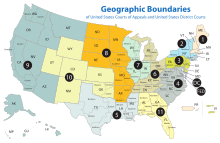United States Federal Courts
The federal courts of the United States (English: United States federal courts ) are a of the Constitution and the federal laws of the United States under lying court system .
Types
The federal courts provide the federal judiciary and include:
-
General jurisdiction :
- the United States District Courts
- the United States Courts of Appeals (with the exception of the United States Court of Appeals for the Federal Circuit )
-
Special jurisdiction :
- United States Bankruptcy Courts
- United States Tax Court
- United States Court of Private Land Claims (1891-1904)
- United States Court of International Trade
- United States Court of Federal Claims
- United States Court of Appeals for the Armed Forces
- United States Court of Appeals for the Federal Circuit
- United States Court of Appeals for Veterans Claims
- Foreign Intelligence Surveillance Court
The federal courts of general jurisdiction and the Court of International Trade were created by Congress under the provisions of the third article of the United States Constitution , which explicitly deals with the judiciary. In contrast, the other federal courts of special jurisdiction were set up according to the powers listed in the first article, i.e. based on the competences of the Congress for certain material matters. The difference is that only the federal courts established on the basis of Article III have to meet the special conditions laid down therein, in particular that the judges are appointed for life. The Supreme Court has always considered the establishment of an Article I Court to be permissible when the constitution does not require the granting of an appeal on which a court would have to decide, ie the establishment of the court is a more or less "voluntary" extension of legal protection which can then also fall short of the standards in Article III.
The third constitutional article calls for the establishment of a Supreme Court and allows Congress to create other subordinate courts and limit their jurisdiction. In theory, Congress could eliminate the entire federal judicial system except for a single Supreme Court judge (who would automatically be the Chief Justice of the United States ). In reality, Congress immediately created a system of subordinate federal courts in the Judiciary Act of 1789 .
Instances of the federal courts
The District Courts are the general courts of action, with Congress having passed laws dividing specific jurisdictions among the special courts or special administrative judges. In such cases, the District Courts serve as the courts of appeal.
The Courts of Appeals are the courts of second instance. They are obliged to hear all appeals from the courts subordinate to them.
The Supreme Court is the final instance in federal jurisdiction. The Supreme Court is generally not obliged to accept appeals and thus has free discretion as to which applications are accepted. In certain special circumstances (for example, in disputes between states ) the Supreme Court is both first and last instance and then has no discretion to intervene.
Federal Courts Restrictions
The Supreme Court has interpreted the Constitution as imposing a number of restrictions on federal courts. For example, due to various doctrines, they are not allowed to negotiate abstract cases (i.e. cases in which the plaintiff has not suffered any real harm) or to make advisory decisions for hypothetical circumstances. Likewise, federal courts are usually unable to overturn decisions made by a state court.
Web links
- CourtWEB , Online Federal Court Opinions Information System

